There Are More Black Catholics in the U.S. Than Members of the A.M.E. Church
How black Americans defy religious stereotypes – and navigate race relations in historically white, European spaces.
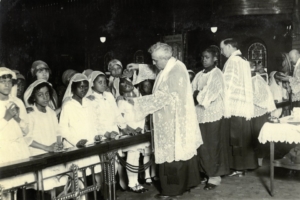
Father Joseph Eckert baptizes a convert class at St. Elizabeth Catholic Church, the oldest African American institution in the archdiocese of Chicago, around 1927. (Courtesy of the Archives of the Chicago Province of the Society of the Divine Word in Techny, Illinois)
(The Atlantic) In the wake of this summer’s white supremacist rally in Charlottesville, Virginia, the United States Conference of Catholic Bishops decided to create a new, ad hoc committee against racism. According to Anthea Butler, a professor at the University of Pennsylvania, it is the U.S. Church’s first major effort to deal with race since 1979.
This is an appropriate moment for the Church to confront this issue. In August, The Washington Post reported that an Arlington, Virginia, priest named William Aitcheson had been arrested in the ’70s for burning crosses and threatening African American and Jewish families as a member of the Ku Klux Klan – and he never paid restitution or apologized to the victims. More broadly, the Church is increasingly experiencing divisions over politics along racial lines: In the 2016 election, 56 percent of white Catholics voted for Trump, compared to only 19 percent of Hispanic Catholics, according to the Center for Applied Research in the Apostolate at Georgetown University.
But racial struggles in the Catholic Church are not just about white versus black or white versus Hispanic. Many black Catholics have struggled over their identity in the Church, writes Matthew Cressler, an assistant professor of religious studies at the College of Charleston, in his new book, Authentically Black and Truly Catholic. In the mid-20th century, the big question was how to reconcile the universal message of a Church that claims to transcend race with evidence that it is a “white racist institution,” as activists put it. (more)
Also: The U.S. Catholic Church’s last major effort on racism was in 1979. Charlottesville woke it up. (read)
Black history in brief
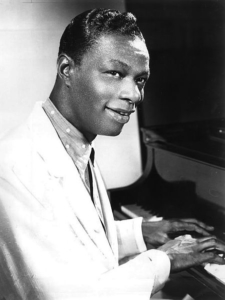
Nat King Cole
November 5, 1956: Nat King Cole became the first African-American entertainer to host a variety TV series. NBC aired the show without commercials, hoping advertisers would be attracted to the series. That never happened because advertisers feared white Southern audiences might boycott their products. When the show was canceled, Cole told Ebony, “For 13 months, I was the Jackie Robinson of television. …After a trailblazing year…, I found myself standing there with the bat on my shoulder. The men who dictate what Americans see and hear didn’t want to play ball.”
November 6, 1814: Writer, abolitionist and historian William Wells Brown was born into slavery in Lexington, Kentucky. In 1834, he escaped to the North and joined abolitionist causes. His novel, Clotel, was reported to be the first novel written by an African American. Brown died on his 70th birthday in 1884.
November 6, 1880: George Poage, the first African-American to compete in the Olympic games and to win a medal, was born in Hannibal, Missouri. At the 1904 Olympics in St. Louis, Poage won the bronze for both the 200-yard and 400-yard hurdles. An integrated audience was not allowed at the event as the organizers had created segregated facilities for the spectators.
November 7, 1967: Carl Stokes and Richard Hatcher became the first African-American mayors of major cities. Stokes became mayor of Cleveland, Ohio, and Hatcher was elected in Gary, Indiana.
November 7, 1972: Andrew Young, a former aide to Martin Luther King Jr., and Barbara Jordan became the first African Americans elected to Congress from the South since 1898. Young was elected to the House of Representatives from Georgia, and Jordan was elected to the House from Texas.
November 8, 1966: Edward Brooke, who prosecuted corruption and organized crime as attorney general for Massachusetts, became the first African American popularly elected to the U.S. Senate. He championed credit and housing for the poor, co-authoring the 1968 Fair Housing Act. He became the first Republican to call for Richard Nixon to resign in the wake of the Watergate scandal. He died in 2015.
November 11, 1831: Nat Turner was executed for leading the uprising of enslaved African Americans in Virginia, where more than 50 whites were slain, and hundreds of African Americans were killed in retaliation. Nearly two months later, Turner was captured and hanged. In response, the South passed oppressive new laws against those enslaved, including the prohibition of their education. His rebellion became the subject of William Styron’s novel, The Confessions of Nat Turner, and Nate Parker’s film, The Birth of a Nation.
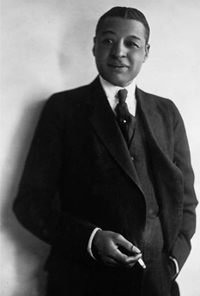
Bert Williams
November 12, 1874: Comedian Bert Williams was born in the Bahamas. He and his longtime comedy partner, George Walker, became popular Vaudeville performers. (Prior to this, every black character had been portrayed by a white actor in blackface.) After Walker’s death, Williams became the first African American to take a lead on Broadway and was also the first black actor to appear in a movie. He became one of the most popular comedians, performing for King Edward VII at Buckingham Palace. Despite that success, he encountered prejudice that prevented him from being invited to join Actors Equity in New York. He performed the song, “Nobody,” later covered by artists from Nina Simone to Johnny Cash. W.C. Fields called Williams “the funniest man I ever saw and the saddest man I ever knew.”
Meet the Oldest Living U.S. Veteran: Austin’s Richard Overton
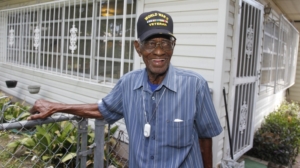
Richard Overton, the oldest recorded living US veteran, surveys the backyard of his home in Austin, Texas. He served for the Army in the Pacific during World War II. (Credit: Jack Plunkett / AP Images for Philips Lifeline)
(History.com) For his first 107 years, Richard Overton lived in relative anonymity. A World War II veteran who fought in the Pacific, he could usually be found post-retirement on the porch of his Austin, Texas, home, smoking cigars and chatting up his extensive circle of family and friends. Then, in 2013, he visited Washington, D.C., and was referred to in the media as the oldest living U.S. veteran. (In actuality, that would not become true until 2016.)
Suddenly, Overton was an in-demand celebrity. Texas Governor Rick Perry showed up at his door bearing whiskey. President Barack Obama invited him to the White House. The San Antonio Spurs gave him a number 110 jersey (his age at the time) and brought him onto the court for a standing ovation. And he became a staple at Austin civic events, such as the annual Veterans Day parade.
Meanwhile, strangers began sending him cigars in the mail, calling him on the phone, or coming by the house to thank him for his military service. “He’s very social,” says Volma Overton Jr., 69, his second cousin once removed, who visits Overton daily. “He’ll spend time talking to everybody and shaking everybody’s hand.” Under doctor’s orders, his relatives limit his porch time so that he doesn’t overextend himself. Yet they acknowledge he thrives on the fame. “He kind of lives off all that,” Volma Overton Jr. says. “He knows that he has this attention and status around the world.” (more)
McKinney’s oldest African-American church to celebrate 138 years
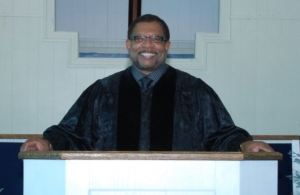
McKinney native Pastor Charles Wattley has pastored Saint Mark Baptist Church for 34 years. (Photo courtesy of Saint Mark)
Driving through the east side of McKinney, it’s not unusual to see an old building here or a historical marker there.
Just off of S. McDonald Street on Wilcox is Saint Mark Missionary Baptist Church. The brick building doesn’t appear to be special, but it’s what’s inside that counts – in every sense of the phrase. Saint Mark, the oldest African-American church in McKinney, will mark 138 years of service and worship with a celebration on Nov. 12.
The church, which began in 1879 as Free Missionary Baptist Church, got its start as a place to worship for former slaves who had been brought to Collin County. The two preachers responsible for establishing the church, Revs. Dick White and Jones, traveled from house to house conducting prayer meetings with early members.
According to the history compiled by church members, “The events leading to the church’s establishment are peculiar for the times and are characteristic of the Negroes’ quest for freedom of worship and the dignity of the individual. God began laying a strong foundation for his people who were about to be free.” (more)
TIPHC Bookshelf
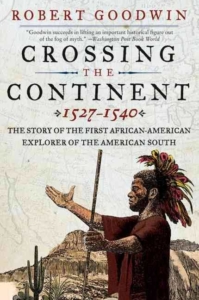 Published scholarship on black history in Texas is growing and we’d like to share with you some suggested readings, both current and past, from some of the preeminent history scholars in Texas and beyond. We invite you to take a look at our bookshelf page – including a featured selection – and check back as the list grows. A different selection will be featured each week. We welcome suggestions and reviews. This week, we offer, “Crossing the Continent,” by Robert Goodwin.
Published scholarship on black history in Texas is growing and we’d like to share with you some suggested readings, both current and past, from some of the preeminent history scholars in Texas and beyond. We invite you to take a look at our bookshelf page – including a featured selection – and check back as the list grows. A different selection will be featured each week. We welcome suggestions and reviews. This week, we offer, “Crossing the Continent,” by Robert Goodwin.
Crossing the Continent takes us on an epic journey from Africa to Europe and America as Dr. Robert Goodwin chronicles the incredible adventures of the African slave Esteban Dorantes (1500-1539), the first pioneer from the Old World to explore the entirety of the American south and the first African-born man to die in North America about whom anything is known. Goodwin’s groundbreaking research in Spanish archives has led to a radical new interpretation of American history – one in which an African slave emerges as the nation’s first great explorer and adventurer.
Nearly three centuries before Lewis and Clark’s epic trek to the Pacific coast, Esteban and three Spanish noblemen survived shipwreck, famine, disease, and Native American hostility to make the first crossing of North America in recorded history. Drawing on contemporary accounts and long-lost records, Goodwin recounts the extraordinary story of Esteban’s sixteenth-century odyssey, which began in Florida and wound through what is now Alabama, Mississippi, Louisiana, Texas, New Mexico, and Arizona, as far as the Gulf of California. Born in Africa and captured at a young age by slave traders, Esteban was serving his owner, a Spanish captain, when their disastrous sea voyage to the New World nearly claimed his life. Eventually he emerged as the leader of the few survivors of this expedition, guiding them on an extraordinary eight-year march westward to safety.
This Week in Texas Black History, Nov. 5-11
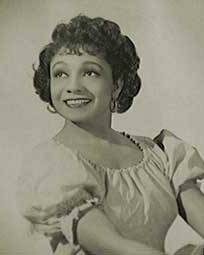
Etta Moten
Nov5
On this day in 1901, actress and singer Etta Moten was born in Weimar, Texas. Moten was touted as the “new Negro woman” for her ground-breaking movie roles. She married Claude Barnett, founder of the Associated Negro Press in 1934 the same year, she became first black woman to sing at the White House when she performed for President Franklin D. Roosevelt’s birthday celebration. For the production of “Porgy and Bess,“ Broadway composer George Gershwin wrote the female lead character with Barnett in mind.
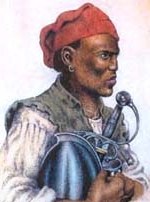
Esteban (Estevanico)
Nov6
On this cold, post-storm morning in 1528, Moroccan Moor servant Esteban (Estevanico) waded ashore near Galveston with a group of shipwrecked Spanish conquistadors and became the first African to set foot in what would become Texas. He and the other survivors would wander for eight years, at times as hostages of Native American tribes, through Texas and along the Rio Grande and into Mexico. Esteban is also considered the first black person to explore Arizona and New Mexico.
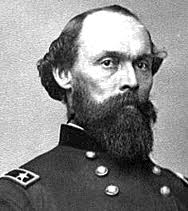
Gordon Granger
Nov6
Maj. Gen. Gordon Granger was born on this day in 1822 in Joy, Wayne County, New York. As Union commander of the Department of Texas, Granger would arrive at Galveston on June 19, 1865 and deliver General Order No. 3 announcing that slaves in Texas were free, as a result of the Emancipation Proclamation, issued two years earlier. The announcement is the basis for Juneteenth celebrations.
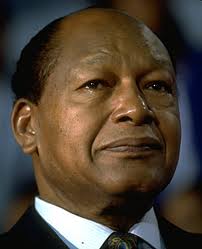
Tom Bradley
Nov6
In 1973, on this day, Los Angeles elected its first black mayor, Tom Bradley, a native of Calvert, Texas. The son of sharecroppers and the grandson of slaves, Bradley moved with his family to Los Angeles at age seven. In 1963, after an outstanding career with the Los Angeles Police Department, Bradley became the first African-American elected to the Los Angeles city council. Ten years later, he became the first African-American mayor of a predominantly white city and served an unprecedented five terms. His achievements included securing the 1984 Summer Olympic Games for Los Angeles.
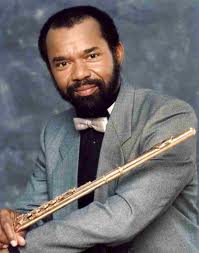
Hubert Laws
Nov10
Renowned jazz flutist Hubert Laws was born on this day in 1939 in Houston. Laws played in the marching band at Phillis Wheatley High School in Houston then studied music at Texas Southern University before beginning his professional career playing in Houston jazz groups such as the Crusaders. Has played an recorded with numerous artists including Quincy Jones, Herbie Hancock, Aretha Franklin, Ella Fitzgerald, and Leonard Bernstein and was recipient of the 2011 National Endowment for the Arts Jazz Masters Award and lifetime achievement award from the NEA in the field of jazz.

Nov10
Wiley College was founded on this day in 1873 and was the first black college west of the Mississippi River. Named in honor of Bishop Isaac T. Wiley, an outstanding minister, medical missionary and educator, the school opened its doors just south of Marshall, Texas with two frame buildings.
Nov11
Captain Norman W. Scales, a Tuskegee Airman and the first licensed black pilot in Austin, was born on this day in 1918. Scales flew 70 missions over enemy territories and earned the Distinguished Flying Cross and certificate of valor.
Blog: Ron Goodwin, Ph.D., author, PVAMU history professor
Ron Goodwin’s bi-weekly blog appears exclusively for TIPHC. Goodwin is a San Antonio native and Air Force veteran. Generally, his column addresses contemporary issues in the black community and how they relate to black history. He and the TIPHC staff welcome your comments.
Latest Entries
A New Hope
Forgive me for borrowing the title of one of the most profitable films in history, “Star Wars: A New Hope.” I’ve always been enamored by space. I’m a child of the 1960s and I remember playing with my Major Matt Mason action figure (not a doll!) as my family [...]
Tell me the truth
Democracy – a) government by the people, b) a government in which the supreme power is vested in the people and exercised by them, directly or indirectly through a system of representation usually involving periodically held free elections. Merriam-Webster Dictionary There were many things I learned from my father. [...]
Submissions Wanted
Historians, scholars, students, lend us your…writings. Help us produce the most comprehensive documentation ever undertaken for the African American experience in Texas. We encourage you to contribute items about people, places, events, issues, politics/legislation, sports, entertainment, religion, etc., as general entries or essays. Our documentation is wide-ranging and diverse, and you may research and write about the subject of your interest or, to start, please consult our list of suggested biographical entries and see submission guidelines. However, all topics must be approved by TIPHC editors before beginning your research/writing.
We welcome your questions or comments. Please contact Mr. Michael Hurd, Director of TIPHC, at mdhurd@pvamu.edu.
